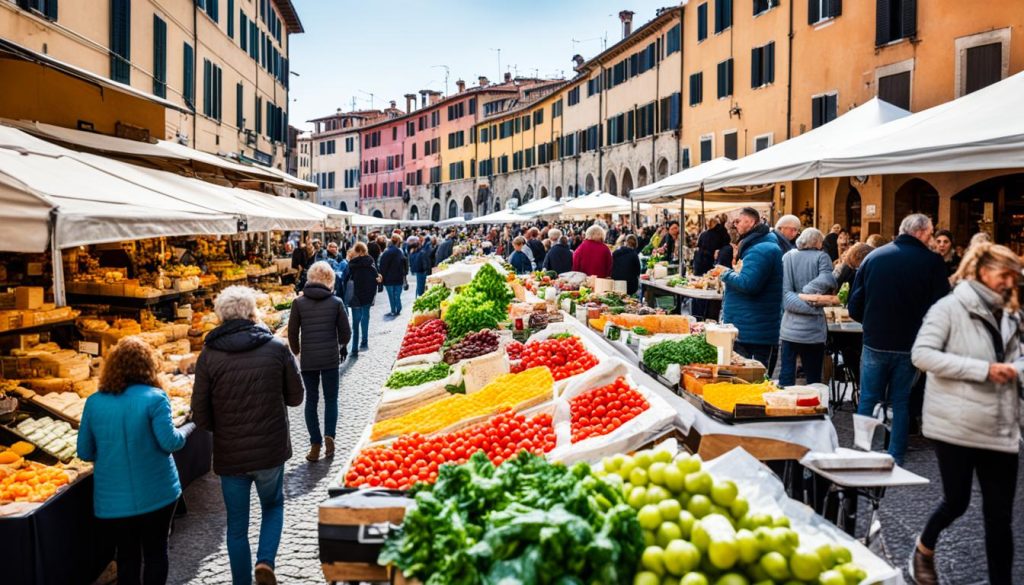Expats often look at moving to new countries. It’s key to know about living in Italy, working in France, and finding jobs in Poland. This article compares these places, looking at living costs, job chances, healthcare, and work-life balance. We aim to help those thinking of moving to these countries.
Key Takeaways
- Understanding the diverse living conditions in Italy, France, and Poland is crucial for expatriates.
- Employment opportunities vary significantly across these countries.
- Healthcare systems play a vital role in residents’ quality of life.
- Cost of living impacts financial planning for relocating families.
- Work-life balance differs, shaping employee satisfaction and productivity.
- Language proficiency is essential for successful integration into the workforce.
Overview of Living and Working in Europe
Living in Europe is a blend of culture and career growth. Each country has its own unique opportunities and challenges for expats. The job market is diverse, welcoming professionals from all over the world.
The European lifestyle is rich in culture, with high living standards and a good work-life balance. Cities like Paris, Berlin, and Warsaw are full of innovation, drawing talent from everywhere. They offer safe cities, quality education, and health care, making them great places to live and work.
Things like community, easy access, and social security are key when choosing where to move. Many expats enjoy learning new languages and traditions. This enriches their personal and work lives. The strong economy of European countries is a big draw for those looking to work and live here.
Introduction to Italy as a Work Destination
Italy is a top choice for those thinking about working abroad. It’s known for its history, culture, and growing economy. These factors make it a great place for expats.
The country has a lively lifestyle and a strong tradition of craftsmanship. This makes the job market in Italy very attractive.
Jobs are plentiful in fashion, automotive, and technology. These sectors draw people from all over the world. The focus on innovation boosts the economy and offers unique job chances in Italy.
But, working in Italy has its challenges. Bureaucracy and regional job differences can make things tough. It’s important to know these things if you want to do well.
Despite the hurdles, the mix of lifestyle and career chances keeps many coming to Italy. This makes it a key place to work in Europe.
Living Conditions in France
Living in France is a mix of old traditions and new ways of life. The country’s culture is rich and diverse, thanks to people from different backgrounds. This mix makes everyday life exciting, bringing new ideas and tastes to the table.
Cultural Diversity in France
French culture is a blend of many influences, making life vibrant. Cities like Paris, Marseille, and Lyon are full of festivals, art, and food from different cultures. This diversity builds strong community ties and encourages creativity among everyone.
People can enjoy cultural events, art shows, and food markets. These activities show how different traditions live together in harmony. They make life better for everyone, especially for expats, helping them feel at home.
Cost of Living and Quality of Life
The cost of living in France changes with the region. Cities tend to be more expensive than rural areas. Things like rent, transport, and everyday costs affect how much people spend.
In Paris, rent is higher than in smaller towns. So, it’s important to plan your budget. But, the quality of life is high, with great public services and transport.
| Category | Cost in Paris (€) | Cost in Lyon (€) | Cost in Marseille (€) |
|---|---|---|---|
| Rent (1-bedroom) | 1,200 | 800 | 900 |
| Groceries (monthly) | 300 | 280 | 290 |
| Public transportation (monthly pass) | 75 | 65 | 70 |
| Leisure activities (monthly) | 120 | 100 | 110 |
France might be pricey, but it offers a great life and cultural experiences. The mix of cultures and quality services make it a popular choice for many. It’s a dream place for those looking to move abroad.
Employment Opportunities in Poland

Poland is growing as a great place to work, with many job opportunities. Sectors like technology, manufacturing, and business services are expanding fast. If you’re thinking of moving, these areas could offer you good chances.
Growing Industries in Poland
Poland’s job market is lively, thanks to sectors that are creating new jobs. Key areas include:
- Information Technology: The IT sector is booming due to more digital use and a growing start-up scene.
- Manufacturing: Poland’s manufacturing is strong, with high standards and lower production costs.
- Business Services: Outsourcing and shared services are creating jobs in finance, HR, and IT support.
These sectors are great not just for their growth but also for drawing in international talent. They help Poland’s economy grow.
Work Culture in Polish Companies
Knowing how work works in Poland is key to fitting in well. Polish companies mix old-style hierarchies with modern teamwork. This approach values teamwork and respects authority, making for good communication and decisions.
- Professionalism: Being on time and following formal rules is important.
- Work-Life Balance: Many companies offer flexible work hours to help with personal life.
- Opportunities for Development: Employers often support training and growing your skills, seeing the importance of learning and getting better at your job.
Expats looking at jobs in Poland will find a welcoming scene. It’s got strong industries and a work culture that helps you grow professionally. Poland is becoming a top choice for skilled workers from all over the world.
Healthcare Systems in Italy, France, and Poland
The healthcare systems in Italy, France, and Poland offer different structures and services for various populations. Each system has its own features that affect healthcare access across Europe. These include public and private options, impacting both locals and expatriates. Knowing about these systems helps people meet their healthcare needs better.
Comparative Analysis of Healthcare Access
How easy it is to get healthcare is key to judging a system’s success. In Italy, most healthcare is public and open to all who live there. Expats can get care too, but they might need to register first, depending on their situation. France is known for its mix of public and private health insurance, giving people choices for their care. Poland is working to make healthcare better, with both public and private options, but faces challenges in rural areas.
| Country | Public Healthcare Access | Private Healthcare Options | Expatriates’ Access |
|---|---|---|---|
| Italy | Universal coverage with regional variations | Wide availability but often expensive | Registration needed, mostly accessible |
| France | Universal system with high coverage levels | Strong private insurance market | Easy access for expatriates with insurance |
| Poland | Universal, but rural areas face challenges | Increasing private sector participation | Registration and insurance important |
Quality of Healthcare Services
The quality of healthcare varies in these countries. Italy’s healthcare is well-known but quality can vary by region. France is often considered one of the best, with high standards of care and happy patients. Poland’s healthcare is getting better, but it needs to improve quality and reach in less populated areas.
Education Systems Affecting Work Opportunities
The way each country approaches education greatly shapes job chances for graduates. Italy, France, and Poland each have their own higher education systems. These systems vary in quality and how much they are recognised. Knowing about these systems can help those looking at jobs in Europe.
Higher Education in Italy vs France vs Poland
In Italy, its universities are famous, especially for arts and humanities. They offer a chance to learn in a place full of culture. Students from all over the world come to study here.
France is known for its tough training, mainly in engineering and business. Its universities are at the forefront of research and are highly valued in Europe. This gives graduates an edge when applying for jobs.
Poland’s universities are becoming more popular. They are offering more courses and getting better in the world. They have great facilities and research chances, making them a good choice for students from around the globe.
The Importance of Language Proficiency
Knowing a language is key in today’s global job market. Not speaking the local language can make it harder to communicate at work. For instance, knowing Italian can really help in finding a job in Italy. Being good at French is also crucial for jobs in France.
In Poland, English is often used in work, especially in big companies. Learning Polish can make it easier to get a job and fit in with local companies. Being good at languages is a big plus for those looking to advance in their careers in these countries.
Compare Living And Work Between Italy, France And Poland
Italy, France, and Poland offer unique experiences shaped by their cultures and economies. Each country has its own special features, fitting different lifestyles and preferences of expats. This look at these countries highlights key points for those thinking about work and living here.
Italy is famous for its deep culture and beautiful landscapes. Living in Italy often means a strong community feel, with lots of social events around family and food. Work-life balance is good, but job chances can change depending on where you are. Northern cities usually have better job markets than the south, affecting expats’ experiences.
France is known for its high standard of living. Work in France comes with strong employee protections, like a lot of holiday time and shorter hours. Cities are culturally diverse, offering great chances for socialising and networking. But, living costs can be steep, especially in places like Paris.
Poland is a rising star in Europe’s job scene. It’s cheaper to live here, making it easy on the wallet for housing and everyday costs. Compared to Italy and France, Poland has a fast-growing economy with lots of jobs in tech and manufacturing, drawing in skilled workers.
Looking at living and working in these countries, it’s key to see what each offers in culture, economy, and lifestyle. People should think about the pros of living in Italy, working in France, and the new chances in Poland to pick the best place for their career.
| Aspect | Italy | France | Poland |
|---|---|---|---|
| Living Conditions | Rich culture, high community focus | High quality of life, diverse culture | Affordable living, low daily expenses |
| Working Conditions | Varied opportunities, work-life balance | Generous benefits, short working hours | Growing job market, focus on tech |
| Economic Opportunities | Stronger in the north | Diverse sectors, competitive jobs | Rapid growth in key industries |
Cost of Living: Italy

Thinking about the cost of living in Italy is key for those moving or working there. It greatly affects your lifestyle and budget. You need to look at housing and transport costs, which change a lot by region.
Housing and Rental Market
The housing market in Italy offers many options for renting or buying. In big cities like Rome and Milan, rent is much higher than in smaller towns. For example, a one-bedroom flat in the city centre costs over €1,200 a month. But in smaller towns, it’s about €600.
| City | Average Monthly Rent (1-bedroom, city centre) | Average Monthly Rent (1-bedroom, outside city centre) |
|---|---|---|
| Rome | €1,200 | €800 |
| Milan | €1,400 | €950 |
| Florence | €1,000 | €650 |
| Turin | €900 | €600 |
| Palermo | €650 | €450 |
Transportation Costs
Looking at transport costs in Italy shows more expenses for residents. Public transport is good, with cities like Milan and Rome having lots of metro and bus lines. A monthly public transport pass is about €35 in big cities. If you prefer a car, fuel and parking can add up. Fuel costs around €1.60 per litre in Italy.
Knowing these costs helps people plan better for living in Italy. It ensures they can enjoy a good life there.
Cost of Living: France
Thinking about moving to France? It’s important to know the cost of living there. Daily expenses greatly affect your finances. In France, costs change a lot based on where you live, your lifestyle, and what you like. Understanding these costs is key to planning your finances.
Expenses on Daily Necessities
Living in France means paying for food, transport, and utilities every day. Your monthly costs can be between €800 and €1,500, depending on your choices and habits. Here are some main daily expenses:
- Groceries: A typical monthly grocery bill ranges from €250 to €400.
- Utilities: Monthly costs for electricity, water, and heating average around €100 to €150.
- Transport: Public transport subscriptions can cost between €50 and €70 monthly, while car ownership involves additional fuel and insurance expenses.
- Entertainment: Dining out once a week may add €100 to €300 to your costs, depending on restaurant choices.
Regional Variations in Costs
Living costs in France vary by region. Cities like Paris are usually more expensive than rural areas. Here’s how costs can differ:
| Region | Average Monthly Costs (€) | Notes |
|---|---|---|
| Paris | 1,500 – 2,500 | High rent and entertainment costs. |
| Lyon | 1,000 – 1,800 | More affordable than Paris, yet vibrant. |
| Marseille | 900 – 1,600 | Lower rental prices and cost of living. |
| Bordeaux | 1,000 – 1,700 | Developing urban area, reasonable costs. |
Cost of Living: Poland
Poland is a great place to live, offering a good balance between cost and quality of life. Its economy is growing, and its culture is rich. Cities like Warsaw, Krakow, and Wroclaw are known for being affordable. They offer a good standard of living at a lower cost than many European cities.
Looking at the cost of living in Poland, we see that housing, food, and leisure activities are key factors. Let’s dive into what makes living here budget-friendly.
Affordable Living in Major Cities
Poland’s major cities, such as Krakow and Wroclaw, are great for those on a budget. They offer a mix of history, culture, and affordable living. Here’s a look at what you might spend on rent, transport, and eating out in these cities:
| City | Average Monthly Rent (1-bedroom) | Monthly Transport Pass | Average Meal (Restaurant) |
|---|---|---|---|
| Warsaw | £600 | £30 | £12 |
| Krakow | £500 | £25 | £10 |
| Wroclaw | £450 | £25 | £11 |
Poland’s living costs are lower than in many Western European cities. This makes it a great choice for those wanting a good life without spending a lot. With its affordable options, Poland is becoming more popular with expatriates and remote workers.
Work-Life Balance in Italy
In Italy, work-life balance is a big part of the culture. People value leisure time and family a lot. This affects how long they work, making their pace of life different from other European countries. It’s important for people moving to Italy to understand this balance.
Typical Working Hours and Holidays
Italian working hours are usually from 9 am to 6 pm, with a long lunch break. This shows how they balance work and personal life. They get 4-6 weeks of holiday a year, showing how holidays are important in Italy.
People use their holidays to travel, be with family, or relax. This helps them enjoy their jobs more and feel better overall.
The following table outlines the common holidays in Italy that contribute to the work-life balance:
| Holiday | Date | Duration (Days) |
|---|---|---|
| New Year’s Day | 1st January | 1 |
| Epiphany | 6th January | 1 |
| Labour Day | 1st May | 1 |
| Republic Day | 2nd June | 1 |
| Assumption Day | 15th August | 1 |
| All Saints’ Day | 1st November | 1 |
| Immaculate Conception | 8th December | 1 |
| Christmas Day | 25th December | 1 |
| St. Stephen’s Day | 26th December | 1 |
This way of taking time off helps people live healthier lives and connect more with family and community. It shows how important work-life balance is in Italy. This mix of work and fun makes life rewarding for locals and expats alike. Knowing this can help newcomers fit in well in Italy.
Work-Life Balance in France

France is dedicated to a strong work-life balance through many initiatives and rules. It values well-being by setting limits on working hours. This lets people have time for both work and personal life. The goal is to keep work from taking over family life.
Regulations on Working Hours
In France, workers can’t do more than 35 hours a week. This rule helps stop people from working too much. It encourages a balance between work and personal life. People get a two-day weekend for rest and family time.
Working extra hours is limited. You need your boss’s okay and might get extra pay for it.
Parental Leave Policies
France shows strong support for families with its parental leave policies. Both parents get paid leave to look after their new babies. Moms get 16 weeks off, and dads at least 11 straight days.
This shows France’s support for families. It helps both parents be there for their kids early on.
Work-Life Balance in Poland
In Poland, there’s a growing focus on finding a good balance between work and leisure. People now want to enjoy their free time as much as they work. This change shows how Polish work culture is evolving, with a greater emphasis on making employees happy and fulfilled.
Many Polish companies now offer flexible working hours. They understand that happy workers are more productive. This means more people are asking for flexible schedules, leading to things like remote work and flexible hours. These changes help keep a good balance between work and life in Poland, making workers more committed and engaged.
Flexible work is just one part of the story. Leisure time is also very important in Polish culture. Things like lunch breaks, holidays, and socialising after work are key parts of life here. As people value their free time more, they work better when they come back, which helps everyone.
The way Polish work culture is changing means finding a good work-life balance is now a key goal for companies. They want to keep good workers happy and healthy. This focus on leisure time in Poland is making the workforce and society healthier and more lively.
Legal Framework for Foreign Workers
The laws for foreign workers differ a lot in Italy, France, and Poland. It’s key to know the rules for getting a work visa in Italy and the immigration laws in France and Poland. This is vital for those thinking of moving abroad for work.
Visas and Work Permits in Italy
Italy has different visas for foreign workers. The most usual one is the work visa, which needs a job offer from an Italian employer. You must show proof of your job, your qualifications, and a clean criminal record. Getting this visa can be complex, so you need to prepare well.
Immigration Policies in France and Poland
France’s policies aim to draw in skilled workers, offering various permits for different jobs and skills. The government supports skilled migrants, especially in areas with a shortage of workers. Poland has changed its immigration laws to help foreign workers settle. They’ve made it easier to get work permits, which is good for employers looking to hire quickly.
Cultural Influences on Work Environment
The work environment in Italy, France, and Poland is shaped by each country’s culture. These influences affect team dynamics, professional relationships, and job satisfaction. It’s key to understand these to get a better view of work life in each place.
Understanding Italian Work Culture
Italy’s work culture puts a big focus on relationships and personal connections. Trust and rapport are big in professional talks. Meetings often start with casual chats to build team spirit.
The structure of the workplace can also affect decisions, often giving more power to those higher up.
French Professional Norms
In France, being professional is top priority. People are encouraged to speak their minds and share their thoughts. This approach boosts creativity and respects authority.
Though work-life balance is valued, many employees give a lot to their jobs. This can make the work environment quite demanding.
Polish Work Ethos
Poland’s work culture is all about hard work, discipline, and being on time. Teamwork is key, with a focus on solving problems together. Polish workers aim for efficiency but also support each other well.
| Cultural Aspect | Italy | France | Poland |
|---|---|---|---|
| Relationship Focus | Strong emphasis on personal connections | Professionalism with direct communication | Teamwork and mutual support |
| Decision-Making | Hierarchical, senior-level influence | Encourages expression of ideas | Collaborative problem-solving |
| Work Ethic | Emphasis on rapport and trust | High dedication, creative yet respectful | Discipline and efficiency valued |
Networking and Professional Growth Opportunities
For expatriates looking to grow their careers in Europe, networking is key. Italy, France, and Poland offer great chances for professional growth. They have many ways to make connections.
Joining professional groups is a great way to meet leaders and mentors. These groups often host events for networking in Europe. These events are perfect for sharing knowledge and improving your career.
In Italy, attending local meetups and workshops is a good idea. These events give insights into the job market and help make connections with locals. France and Poland also have strong networking opportunities through industry conferences.
Using digital platforms for networking can also help a lot. Sites like LinkedIn let expatriates connect with people across borders. By being active online, you can boost your career and join a global network of professionals.
FAQ
What are the key factors to consider when living in Italy?
Important things to think about include living costs, differences across regions, and the quality of life. It’s also key to know about local customs and the work culture for expats.
How do employment opportunities in France compare to those in Poland?
France has a strong job market with a focus on balancing work and life. Poland is growing in sectors like IT and manufacturing. Salaries and job security differ between the two countries.
What is the healthcare system like in Italy, France, and Poland?
Italy has a public healthcare system that covers everyone. France is known for its excellent services and high patient satisfaction. Poland’s healthcare is getting better but might struggle with access and funding.
How does the cost of living in France vary by region?
Living costs in France are higher in cities like Paris than in rural areas. Things like housing, food, and transport affect your expenses, depending on where you live.
What educational opportunities are available for expatriates in Italy?
Italy has many top universities. Knowing Italian can help you get a job and fit in better in the local market.
What legal requirements should foreign workers be aware of in Poland?
Foreign workers in Poland need the right visas and work permits based on their country and job type. It’s important to know the immigration rules for a smooth move.
How do cultural influences affect the work environment in France?
France values a good work-life balance and family, which shapes work rules like hours and holidays. This attracts people who value their personal life.
What networking opportunities are available for expatriates in Europe?
There are many chances to network through professional groups, conferences, and local events in Italy, France, and Poland. These help with career growth and making connections in Europe.









